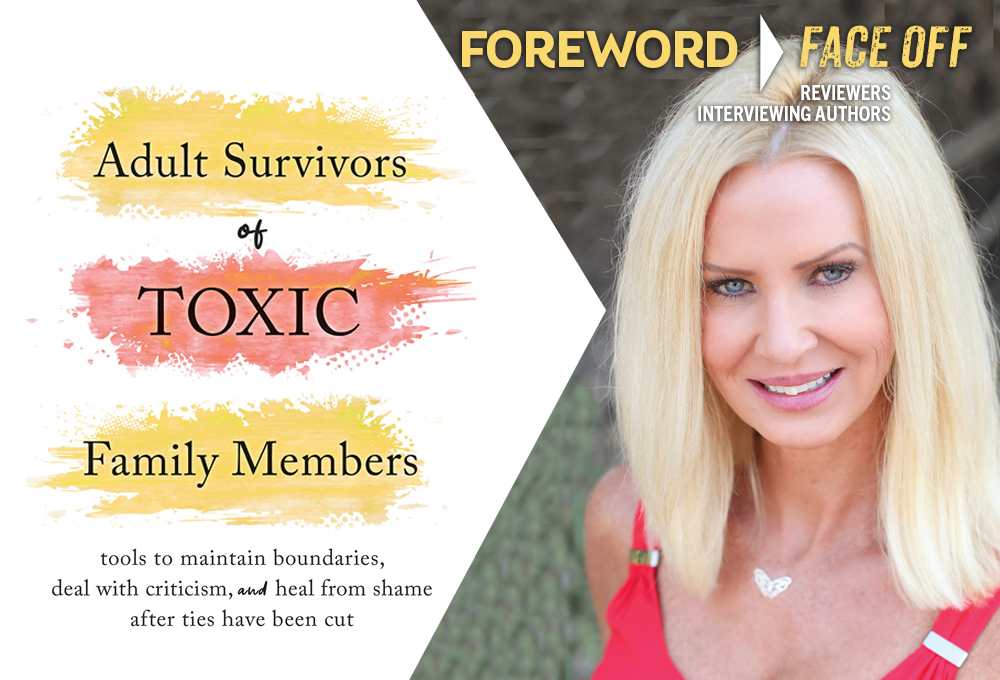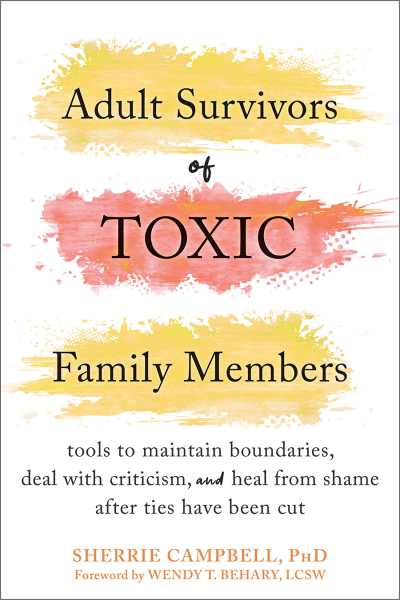Reviewer Melissa Wuske Interviews Sherrie Campbell, Author of Adult Survivors of Toxic Family Members: Tools to Maintain Boundaries, Deal with Criticism, and Heal from Shame After Ties Have Been Cut

If you’re looking for a path to saintliness, practice the art of forgiveness—the most heavenly of all mortal deeds. But forgiveness is tricky. To forgive someone who seriously wronged you should never mean that you wipe the slate clean, should never mean that you fully reengage with that person and potentially put yourself in harm’s way once again.
Considering the many causes of breakdowns and breakups in relationships, let’s face the fact that some of the most difficult situations in human existence occur when members of a single family have a falling out—as Shakespeare, Mario Puzo, and many other writers have explored to great effect. Blood is blood.

With these thoughts in mind, let’s welcome Sherrie Campbell, author of Adult Survivors of Toxic Family Members, to talk about what makes family strife so devastating. In addition, she offers bracing advice for anyone who has long struggled with a disruptive sibling or parent.
Are you ready for this: cut them off completely!
Sherrie is concerned about your sanity, which requires that you set the strictest of boundaries between you and your toxic kin, which also means that you stop believing the nonsense that you are part of the problem. The brother you are cutting off will find more prey to target. You are not special. And don’t fool yourself: he will never change.
Yes, her advice may sound coldhearted and potentially upsetting to your family, but you’ll come to better understand her reasoning in the following conversation with Melissa Wuske.
But first, a message from the chief: Are you interested in being among Foreword‘s team of intrepid freelance reviewers, who see the best of independent publishing first? We are currently hiring! All you need to do is send our editor in chief, Michelle Schingler, a note expressing your interest, along with any writing samples that might show how you’d fit in among our team. We look forward to reading with you! mschingler@forewordreviews.com
The book begins with the concept of permission. Why is that concept so important when setting boundaries, particularly for survivors of toxic relationships?
Permission is important when you have been raised as guilty until proven innocent, no matter the situation or topic. You have no rights under a toxic family system, so there is no permission for you to use your voice, hold your own opinions, or to embrace your own individuality. You are taught to obey. In a toxic family system, you are to be seen but not heard. In this book, survivors are given the permission they need to use their voices to express who they are and what they need, even when setting the necessary boundaries exposes the abuses they endured and the family members who abused them.
Happiness is each person’s birthright, as is one’s own personal freedom. I advocate for all survivors to step into establishing their rights as human beings and help them to define their lines of tolerance. Each survivor has the right to be the author of their life and teller of their own story. This book gives them the permission to just that.
What are some ways to identify whether a less-than-ideal relationship is in fact toxic?
When you live in constant fear and confusion in relationship to your family members, this is a sure sign that the relationship/s are toxic.
Your book advocates for no-contact boundaries: “a prohibition of direct or indirect contact of any kind—physically, verbally, or anything in writing—between yourself and another person or group.” To some, that may seem extreme. Why is this kind of clear, decisive boundary so essential for survivors of toxic family members?
Toxic family members thrive on gaining two things from their victims: their attention and emotional reaction. These two things provide a potent fuel to the power-holders of the family. No contact protects the victim from feeding the egocentric desires of the power-holders to control and manipulate them. No contact is ultimately not about the abuser but the survivor. No contact boundaries are established not to hurt the abuser or to “win” from a place of ego. No contact boundaries are set for the sole/soul purpose of self-protection and self-preservation so the survivor can move more healthfully and fearlessly through life.
The path to personal healing, described in the book, is a deeply rewarding yet difficult process. Can you give some words of encouragement for those moments when people may wonder whether overcoming shame and developing self-love will be worth the struggle?
My advice is never to give up. I have provided a path up the mountain of healing, clearing the cobwebs of confusion all along the journey in this book, and will continue to do so in subsequent books, as well. The best revenge is to move on and to be happy and not allow your toxic family members to steal even one more minute of your life. They have taken enough, and you have paid you dues. Keep your boundaries firm and shift the focus from your abusers back onto yourself and the life you now have the freedom to create. You may always feel some loneliness inside, but remind yourself it is better to be lonely than disempowered, controlled, manipulated, and miserable. Life will get better. Stay the course.
What kinds of transformation have you seen in the lives of people who’ve followed the path set out in your book?
I have seen people come back to life! I get to see this every single day in my social media and in my private practice. I have had many readers tell me I saved them from suicide and that my books have cleared the confusion that had so deeply weakened their resiliency. I have seen people go from hopeless to hopeful and vibrant. I have seen people taste freedom and feel liberated. It’s the most beautiful thing to ever witness to come from something I have put into writing. Tears.
What are some ways friends or healthy family members can support a person who is working to heal from a toxic family relationship?
Validate their experience and support their decisions to cut ties fully and without question.
Melissa Wuske
